
Photo by Jean Chien
Ford Performance: Staying Ahead of Tradition
by Bart Bull
 Henry Ford was a nut, but he was an ungodly rich American nut, and when he got a bug up his butt, he had the resources to do something about it. He started his own newspaper, The Dearborn Independent, and when that was insufficient for spreading the hot news about the Hebrew-haters preferred hoax, “The Protocols of the Elders of Zion,” he distributed it through Ford dealerships and had it translated into German. When he decided he needed a dam, he hired forty Negroes to dig him one, specifying an all-colored crew to his contractor, then had them knock off work to sing him Stephen Foster songs — he was especially fond of “Old Black Joe” and “Old Kentucky Home.” Once he decided that the contemporary world had gone to hell in a handbasket, he set himself up with a Never-Never Land right there in Dearborn and named it Greenfield Village. It was a psychic twin to John D. and Abby Aldrich Rockefeller's Colonial Williamsburg (and both places were kin to Walt Disney's seven-eighths scaled Main Street USA, with its banjo-spanking Dixieland band, striped coats and straw hats direct from the blackface minstrel walkaround.)
Henry Ford was a nut, but he was an ungodly rich American nut, and when he got a bug up his butt, he had the resources to do something about it. He started his own newspaper, The Dearborn Independent, and when that was insufficient for spreading the hot news about the Hebrew-haters preferred hoax, “The Protocols of the Elders of Zion,” he distributed it through Ford dealerships and had it translated into German. When he decided he needed a dam, he hired forty Negroes to dig him one, specifying an all-colored crew to his contractor, then had them knock off work to sing him Stephen Foster songs — he was especially fond of “Old Black Joe” and “Old Kentucky Home.” Once he decided that the contemporary world had gone to hell in a handbasket, he set himself up with a Never-Never Land right there in Dearborn and named it Greenfield Village. It was a psychic twin to John D. and Abby Aldrich Rockefeller's Colonial Williamsburg (and both places were kin to Walt Disney's seven-eighths scaled Main Street USA, with its banjo-spanking Dixieland band, striped coats and straw hats direct from the blackface minstrel walkaround.)These were industrialist fantasies of pre-industrial feudal villages — once she'd presided over the founding of the Museum of Modern Art, Mrs. Rockefeller sent forth her minions, collectors who would shortly be dubbed "curators" and they worked New England and the Mid-Atlantic states the way maidenly New Englanders were working the mountains of the South, hunting for the pure and the purer. Her employees gathered up weather vanes and quilts, pried Pennsylvania Dutch hex signs off the front of barns, loaded trucks with cigar-store Indians and sewing baskets and duck decoys, each and every one of them by that celebrated and super-prolific folk artiste "Anonymous." Then she commissioned her curators to come up with a definition of "folk art" that would fit a collection that included no totem poles or kachinas or Navajo blankets or santos or bultos or bottle trees or wrought iron work or anything else made by anyone who wasn't rustic, white, and located on the eastern seaboard. Mary Black, the director of Abby's collection, declared, "The genesis, rise and disappearance of folk art is closely connected with the events of the 19th Century when the dissolution of the old ways left rural folk everywhere with an unused surplus of time and energy." It was a theory to warm the heart of any Rockefeller.
Henry Ford, on the other hand, was a nouveau riche buttinski who supplied his own damn theories, and plenty of 'em. He turned collectors of his own loose, hunting for backwoods fiddlers who could remember the words and melodies of the old tunes, the fiddle tunes that were American's true pure heritage. He set himself up a dance hall in his factory's Engineering Lab, with his fiddle-and-dulcimer orchestra on hand at all times. He hired a dance instructor and produced a book, Good Morning — After a Sleep of 25 Years Old-Fashioned Dancing Is Being Revived by Mr. and Mrs. Henry Ford, then distributed hundreds of thousands of copies, just as he did with the Protocols. The book's rules of etiquette were as rigid and unwavering as a manual for a mass-production line.
By now, Henry Ford had dance fever. He traveled the country preaching the gospel of his square-danced etiquette. At his factory, engineers were constantly being dragged onto the dance floor, and on his Georgia plantation, Negro children were taught the polka. He created his own record label for "Henry Ford's Old Time Dance Orchestra." When his collectors brought Stradivarius violins for his approval, he'd saw off a fiddle tune, then write a check. He purchased the cottage where Stephen Foster was born and had it moved to Greenfield Village. He bought a Cape Cod windmill, and English shepherd's cottage, the schoolhouse where the author of McGuffey's Reader swatted his first sleeping students, the Springfield courthouse where Abe Lincoln lost his first court case and the Ford's Theater chair Lincoln was sitting in when John Wilkes Booth shot him. He came within days and dimes of buying a pickled corpse alleged to be Booth. He tried to have Foster's Old Dog Tray exhumed and stuffed but the operation was a failure. He purchased a dozen railroad cars of research on the folkloric history of "Mary Had A Little Lamb." (The poem's author died at seventeen, the lamb was gored by a cow, and Mary herself ended up in an asylum.)
 Henry Ford had hated farm life when he was a boy stuck on a farm, and he invented his way out of it — a couple of ways. Late on a night in 1936, one of the many family acts who were making it through the Depression off country music drove down a Michigan road trying to find a tourist court so they could sleep. It was the Rhodes Family — brother Speck Rhodes would play bass with Porter Wagoner for many years, all the while playing the Toby role, a black-toothed rube variant from the minstrel days, the white Jim Crow, the Arkansas Traveler's squatter. Exhausted, they found a country road — it sure seemed like a country road — so they pulled over and slept in the car. A guard woke them in the morning; they had spent the night in Henry Ford's driveway. He'd let them stay there because they drove a Ford. "Sure enough," says Speck's brother Dusty, "...here comes Henry Ford with two bodyguards. He was a real nice fellow and after we talked to him for a while he asked us to plays some music. He really did like country music." He asked Dusty Rhodes if he wanted to play one of his fiddles, then sent the servants to fetch it. "This is a genuine Stradivarius violin," Ford told him, "and is worth $150,000." He asked me if I would play 'Red Wing' for him because that was his favorite fiddle tune. So I played 'Red Wing' and several other tunes for him on that Stradivarius fiddle."
Henry Ford had hated farm life when he was a boy stuck on a farm, and he invented his way out of it — a couple of ways. Late on a night in 1936, one of the many family acts who were making it through the Depression off country music drove down a Michigan road trying to find a tourist court so they could sleep. It was the Rhodes Family — brother Speck Rhodes would play bass with Porter Wagoner for many years, all the while playing the Toby role, a black-toothed rube variant from the minstrel days, the white Jim Crow, the Arkansas Traveler's squatter. Exhausted, they found a country road — it sure seemed like a country road — so they pulled over and slept in the car. A guard woke them in the morning; they had spent the night in Henry Ford's driveway. He'd let them stay there because they drove a Ford. "Sure enough," says Speck's brother Dusty, "...here comes Henry Ford with two bodyguards. He was a real nice fellow and after we talked to him for a while he asked us to plays some music. He really did like country music." He asked Dusty Rhodes if he wanted to play one of his fiddles, then sent the servants to fetch it. "This is a genuine Stradivarius violin," Ford told him, "and is worth $150,000." He asked me if I would play 'Red Wing' for him because that was his favorite fiddle tune. So I played 'Red Wing' and several other tunes for him on that Stradivarius fiddle."Ford sure did love country music. "Red Wing" had been written and published in 1907 by Tin Pan Alley's Kerry Mills, author of "Rastus On Parade" and of "At A Georgia Camp Meeting" as well, the biggest cakewalk hit of the whole coon song era. Mills had been head of the violin department of the University of Michigan School of Music; he'd snagged the melody, all too appropriately, from Schumann's "The Merry Peasant." To this day, "Red Wing" is known as an old fiddle tune. (My mom, Lawrence Welk's cousin, Francesca Schweitzer Bull, has always played it oom-pah accordion style on the organ, but that's pretty much how she plays everything.) It is an old fiddle tune, just as it was in 1937, maybe just as it was by 1908. The vogue for coon songs was cooling down, and a brief fad for frontier Indian romance numbers came and went. It was a coon song of a different sort, and Henry Ford was right. It was country music, just as his driveway was close enough to a country road to fool country folks in a country band. Henry Ford, the man who killed off the horse-and-buggy-era, once the fastest man in the world, died by the light of a coal lamp. And that $150,000 fiddle of his? "Well," says Dusty Rhodes, "I have to admit that I didn't like it any better than the one Daddy made for me."
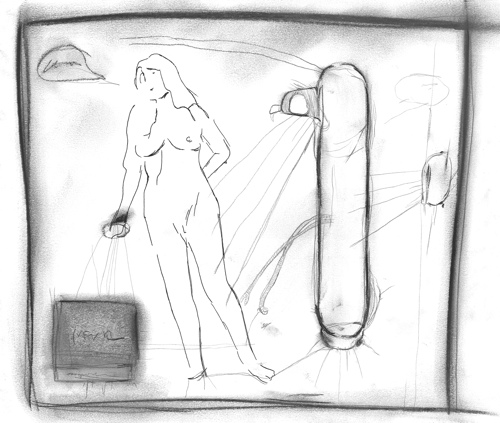
Drawing by James Fotopoulos
8 Seconds Over the Hollywood Freeway

Photo by Chris Collins
From the desk of Joe Carducci…
The Chicago Tribune is hanging on by its television operations. The Chicago Sun-Times is cheaper to run but who knows how it survives? It does, though, and manages to cough up a few useful items most days. It was hurt by the implosion of Conrad Black’s newspaper chain because it had drawn editorially from the National Post, the London Telegraph, and the Jerusalem Post, which though it lent an un-Chicago flavor of conservatism to the paper, made for a full spectrum local-world view. The Sunday Sun-Times this week split its front page between Second City’s 50th Anniversary and the recent cull of formerly million dollar local radio talk talent (Steve Dahl, Jonathon Brandmeier, etc.) courtesy newer, harder numbers from Arbitron’s Portable People Meter, with a banner on top about the Bulls’ troubles.
But what’s most notable are four interesting pieces by staff writer Dave Hoekstra. I guess he’s a columnist officially though he used to be the paper’s blues-roots music specialist. He contributes two good examples of his music writing, though neither is about blues per se. Here Hoekstra dissects Donny Hathaway’s “This Christmas” from 1970. And here he debriefs guitarist Phil Upchurch on his recent Bob Dylan Christmas album session.
It’s good to know Upchurch was on those Rotary Connection albums!
Then the hardworking Hoekstra covers the end of a Christmas tree farm on the Rock River in Oregon, Ill. called the Sinnissippi Forest after the Indian name for the river. The trees were planted a century ago by a Pullman daughter and it closes Dec. 23rd.
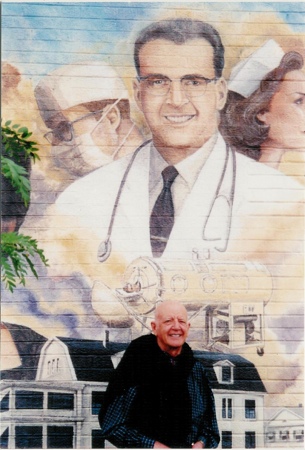 And turning to tourism Hoekstra gets the call on Naperville’s push to get a reputation as a local getaway destination because he’s from here.
And turning to tourism Hoekstra gets the call on Naperville’s push to get a reputation as a local getaway destination because he’s from here.Dave got to town in 1967 and was the editor of the Naperville Central High paper which probably explains how I never heard of him. I volunteered for nothing! But I can remember every failed attempt by some hippie-or-other to open a record store in town, to replace the original Dale’s TV & Radio Service, where you could throw 45s on a small player in a booth and survey the top 40 until it closed in 1966. I got to Naperville in 1956 so his bemused review of Naperville as a tourist destination isn’t so current nor deeply rooted as it might’ve been. The town was about 20,000 when he arrived but only 6,000 when we got here. (It might be 145,000 now) The murals he tweaks the city for not being ready for when he was proposing it as a high school know-it-all feature among others, my dad who was several generations' favorite family doc; a brother continues that practice today.
He rightly notes Centennial Beach as a principal attraction, built of stone from the nearby quarry in the late twenties for the town’s Centennial celebration. (Most river towns in Illinois were settled northward from the Ohio River or eastward from the Mississippi which is why Chicago is one of the younger towns.) I remember being at the Beach once and overhearing one of the Wherli elders claiming it was the best water-hole in the nation. He was surely right. It’s a lot cleaner today, and the nearby river has been reclaimed for walking. I walk it regularly now that I’m back in town to help out my parents. The Riverwalk is the best boondoggle the good citizens have been swindled over, and the Carillon, also along the river, is the second best swindle. It tolls on the quarter hour, and after the noon tolling a song or two is performed on its 72 bronze bells. But the Wherli clan also owes this town big-time for its erasure of the what would have been the downtown’s hood ornament -- the Naper Theater marquee. The town wasn’t ready for R-rated movies back then and so while the kid films killed on the weekend, they died on the weeknights and ended the old family-run theater, and the Wherlis turned it into a Goddamn appliance store. The town still looks pretty good at night, but with that cheap-deco marquee lit up it really would’ve been something.
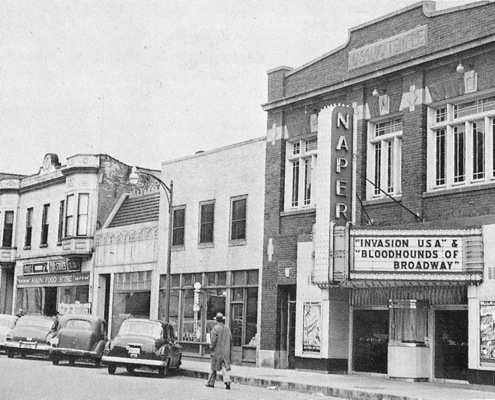
[Naper Theater 1952, Naperville, Illinois]
***
On Sunday the NYT Denver bureau reporter Kirk Johnson told some great stories of rural Wyoming and Nebraska old folks living on their own. The political use his editor back in Manhattan attempted to put these stories is what runs continual interference on these portraits of a generation now leaving the stage. And the implied endorsement of whatever comes along under the name of health-care reform seeks to end any kind of life that might allow the formation of such character. And so sympathy hides envy which seeks to destroy.
David Carr’s Monday media column in the NYT takes on WSJ for just such politicization of news reportage by editorial board. Rupert Murdoch was accused of this before he bought the WSJ; back when the WSJ under the late Robert Bartley was accused of lesser crimes like driving Vince Foster to suicide. James Taranto picks apart the NYT editorial policy positions behind the paper’s news stories on a daily basis, much as Ira Stoll once did at his long-gone Smarter Times blog. There’s more daily paydirt there, pouring out of its D.C. bureau, not to mention what drips from its Denver one, than Carr could hope to dig up in a month of Journal bylines. Bartley and his board probably began the attempt to harmonize the paper’s voices after two of their reporters, Jane Mayer and Jill Abramson, won positions at the New Yorker and New York Times with their attempted takedown of Clarence Thomas which began in their reporting on the confirmation hearings in the Journal. The official WSJ response to Carr’s column has interesting assertions of small deeds.
And then there’s Sunday’s Frank Rich column, today again one-day-only a movie review of some new square-jaw political fairy tale starring George Clooney. It’s a masterpiece apparently meaning it has something to do with Frank’s take on Frank’s view from his 1200-word Olympus. I remember reading his movie reviews back in the seventies in New Times magazine. Broadway destroyed his taste.
***
The ex-Baffler editor, Thomas Frank, who replaced Al Hunt as the WSJ’s lone liberal columnist must be suspect, not that the position offers much except a conservative readership. Al wasn’t any good; I remember he steadfastly refused to see the Republican swing in the House (his beat) until for housekeeping reasons and some measure of respect he predicted it the Thursday before Black Tuesday. But Frank’s book, What’s the Matter with Kansas? was a big idea book for the Democrats and the left generally. (Though a simple jiu-jitsu move by Ted Rall asking, "What’s the Matter with Manhattan?" seemed to obviate any need to read the damn thing.) Frank this week in the WSJ fancies he knows Chicago as well as he knows Kansas as he went to college there. However, his political party is brain-dead but for the reformist ideas come out of the Daley machine, mk two. Daley’s reforms like his father’s never ran ahead of the polity for whom they are designed for mere personal aggrandizement, normally a reflex among pols. But if you subtract Daley’s initiatives on the public school reform and public-privatization there is no sign of life in his national party but new taxes and more regulations. He found the space between vouchers and the teachers’ union tyranny, to whatever effect. But the Democrats were losing urban mayoralties and eastern governorships before Daley.
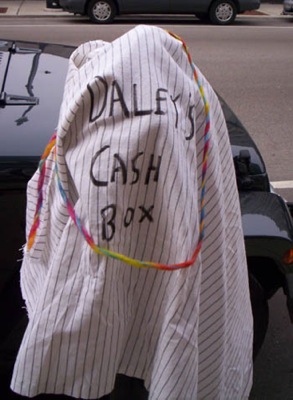 They better get used to a post-Daley party because losing the Olympics, his wife’s cancer, his friend’s suicide, and the disappointing reality of launching a president and then losing him to foreign affairs is driving him into retirement. Thomas Frank is too young or maybe majored in the wrong thing to remember why privatization ever came up after the Great Society hangover, so he thinks of it as mere plot and ruse. Daleys forget nothing and the boys remember the cost to the city of full-on no-holds-barred patronage. Richard M. Daley wants the Shakman decree lifted but he doesn’t imagine a return to what existed when Richard J. Daley came into office in 1955. I remember living in Chicago under Daley, Washington, Sawyer and Daley and in the nineties the non-privatized parking meters were second among the reasons I left town. The meters’ springs were jerry-rigged fast so you’d buy an hour, get back in forty-five minutes and find the meter expired and a sixty dollar ticket on your windshield. Being half-Italian I used to piss on the ticket, write a check for slightly less than the amount and throw pennies into the envelope and mail it in. I figured I better move to where parking is not an issue.
They better get used to a post-Daley party because losing the Olympics, his wife’s cancer, his friend’s suicide, and the disappointing reality of launching a president and then losing him to foreign affairs is driving him into retirement. Thomas Frank is too young or maybe majored in the wrong thing to remember why privatization ever came up after the Great Society hangover, so he thinks of it as mere plot and ruse. Daleys forget nothing and the boys remember the cost to the city of full-on no-holds-barred patronage. Richard M. Daley wants the Shakman decree lifted but he doesn’t imagine a return to what existed when Richard J. Daley came into office in 1955. I remember living in Chicago under Daley, Washington, Sawyer and Daley and in the nineties the non-privatized parking meters were second among the reasons I left town. The meters’ springs were jerry-rigged fast so you’d buy an hour, get back in forty-five minutes and find the meter expired and a sixty dollar ticket on your windshield. Being half-Italian I used to piss on the ticket, write a check for slightly less than the amount and throw pennies into the envelope and mail it in. I figured I better move to where parking is not an issue.***
The Christian Science Monitor takes the physical assault on the Italian P.M. Berlusconi as a bell tolling in the minds of knowledgeable Italians concerned for the direction of the Italian political discourse, namely that it could return to the “years of lead.”
While the NYT (again!) merely concedes the attacker was likely mentally ill and then goes on to suggest a laundry list of reasons any sane person might brain Sylvio. The Times then calls on some supposedly above-it-all ex-Communist (aren’t they all?) to consecrate such reasoning-let’s-call-it. Berlusconi may only be a media-brokered transitional figure but that can be progress if one simply asks the question, Compared to what? And Italians want him when their other choices are professional members of a political class that is one-part mafia, one-part Marxist, one-part Christian Democrat. (See the recent film Il Divo -- if only our many Nixon films were as interesting.) The professional pols in pretend-high-dudgeon (award-winning performances all as judged by the dailies) pulled Berlusconi out of office once and the electorate put him back in with knowledge aforethought. On day two the NYT further implicates itself by seeking to take the edge off the attack describing the statuette as having been “lobbed.” It’s so small of the Times it makes one wonder what the editors wish for Italy or here.
***
Crawdaddy and the end of Editor & Publisher.
***
French pols prosecute in their demand for respect from websites, bloggers, and even commenters as their sweetheart deal with the political press corps comes to an end decades after it ended in the US, the UK, and Italy. Also in France-Cyberspace relations, President Sarkozy launches national digitization project, “We won’t let ourselves be stripped of our heritage to the benefit of a big company, no matter how friendly, big or American it is.”
***
The late Jean-Francois Revel’s book in translation, Last Exit to Utopia, reviewed by Bret Stephens who quotes Revel earlier, “The totalitarian phenomenon is not to be understood without making an allowance for the thesis that some important part of every society consists of people who actively want tyranny: either to exercise it themselves or -- much more mysteriously -- to submit to it.”
***
And here’s one of those oblique approaches to tyranny in the NYT Science section appropriately enough (Of musicians extant there are probably less than 1% worth listening to; Of scientists the same.). These Rube Goldberg mechanistic “solutions” always remind me of the Gort option illustrated in The Day the Earth Stood Still. Let’s just submit to a race of robots programmed to incinerate any aggressor at the first sign of aggression. Yeah why not, the Albert Einstein stand-in played by Sam Jaffe seemed alright with it. The world’s scientific community that Sam calls to Washington D.C. because the politicians can‘t do anything seems to have reached consensus.
This brand new cleverdick scenario of John Tierney’s begins, Earth has one climate; it never changes. Anything else is our class enemies' doing though we’ll most generously and humbly agree to use the royal we as if we blame ourselves as well as those we hate so we can put a humanist masque over our class-bound power grab.
These scientists and their abusers in the media are playing with their own inability to keep the scales of things in mind. The world economy, never mind the earth, are not human in scale. Economic downturns do not erase all of the wealth created since the previous downturn, although I suppose its possible -- that would be a bottom though and time to buy. Old-line Marxist literature always read as if the working class was increasingly impoverished instead of buying a new boat or a second car. The New Left then gave up and began a critique based on the spiritual bankruptcy of… the working class, and switched to a racial paradigm.
When the economic growth rates in the first, second and third worlds sink under these new ecological burdens what will be done about the rise of violent crime and insurrection? We’re up to our ankles in blood now; when it’s to our knees? Gort.
***
Christopher Caldwell in the FT focuses on the weakness of the inevitable mini-UN debasement of Climate Science as deals get cut in this real world.
***
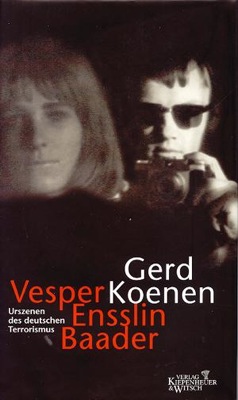
The love triangle of Bernward Vesper, Gudrun Ensslin, and Andreas Baader has yielded the Vesper-Ensslin letters. Ensslin to Vesper, who raised their son, “If we made a mistake, then we made a mistake (I don’t see it myself); after all, what’s been missing in the European fight for socialism over the last 100 years, is the element of ‘madness’.”
***
Cemetery plunder for Cuba’s other religious export to Venezuela.
***
Mary Anastasia O’Grady Truth Commission on FARC’s Peace Community.
***
Racism at ‘shocking’ levels in EU?
Hardly if you were paying attention. The anti-Americanism that’s been building since the end of the U.S.S.R. (France’s concern for the hyper-power began in the mid-1990s) was in truth anxiety over the racial straits Europe was clearly then getting itself into without a plan. As with many European high-minded policies, their refugee and immigrations policies were conceived against American practices, in the certainty that at base America was still a Bull Connor nation. The extra juice to recent anti-Americanism, then, is cover for this disastrous predicament they’ve gotten themselves into.
***
The Value Added Tax that has retarded Western European economies to minimal growth rates is often proposed here as in Friday’s NYT piece. Politicians love the idea that the tax would be baked into the wholesale-supplier transactions rather than visibly at the register or on the paystub or 1040 form. Here’s Catherine Rampell’s classic NYT construction: “Since then (1986 tax-code changes), federal spending has ballooned, while the government’s ability to raise taxes has become increasingly inefficient.” Inefficient?! She doesn’t write the ability to raise revenue, so you’re left wondering again about the NYT.
***
Associate Professor Joseph Massad explains how homosexual identity is exported to the Muslim world where apparently sexual repression really took, probably on the back of their more general submission mission. I’m guessing he says it more crudely in Arabic.
***
The Muslim Jesus is not crucified but ascends directly to heaven. Any crucifixion would be an abomination in what was a late-occurring provincial poverty culture’s warrior cult re-imagined to compete against the neighboring rising monotheist cultures. The crucifixion spoke to a world in the worldly and spiritual languages of animal husbandry, and animal sacrifice. Though not all desert tribes had reached a sophistication necessary to comprehend the need for that breakthrough. Some thought rather they might take advantage of any peacemaking competitors. Christ’s doom is the light by which we see man’s common sin and ready ourselves to live together in larger populations. If Christ is not crucified the story isn’t told, the faith doesn’t spread. And the warrior cult that rejects this does not therefore step forward; it merely seeks to take advantage of the decadence on the other side of Christ’s sacrifice.
***
Whatever you do Tony do not turn your pitiless linguist schtick onto Islam; keep it to one side of the issue. That’s my advice.
***
Roger Ebert reminds us of the pre-P.R. veto years, a post-war golden age of thinking talking actors doing promotion by more or less being themselves.
***
Harvey Kubernik is an -ahem- author, you know… of a book. Judging by the summaries, Harvey’s got a Volume Two in him as well.
***
“I think we’ve kind of insulted our readers’ intelligence with the assumption that everything has to be serious, everything has to be long form.” Adi Ignatius, define your terms, please. He’s the new editor-in-chief of the Harvard Business Review, and formerly the deputy managing editor of Time magazine where they dumbed everything down and then proudly began signing their names to it all.
***
Spot in review out L.A. way, by Greg Burk.
***
Michael Hurley in review by Peter Margasak, also on Mike McGonigal’s gospel comp.
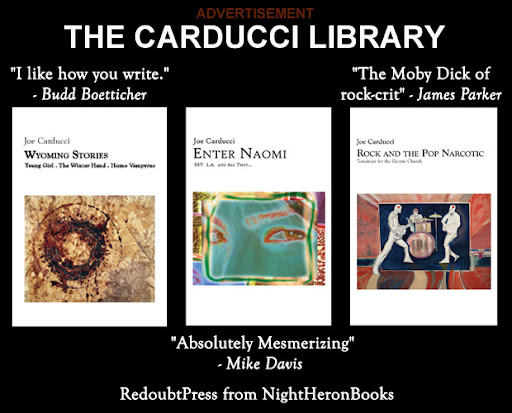
To receive a weekly update notice for the NV, send an email to newvulgate[at]sbcglobal.net with SUBSCRIBE in the subject line. To stop receiving notices, do the same with the word UNSUBSCRIBE.
• The New Vulgate
• Joe Carducci, Chris Collins, James Fotopoulos, Mike Vann Gray, David Lightbourne
• Copyright retained by the writer, artist, or photographer
No comments:
Post a Comment